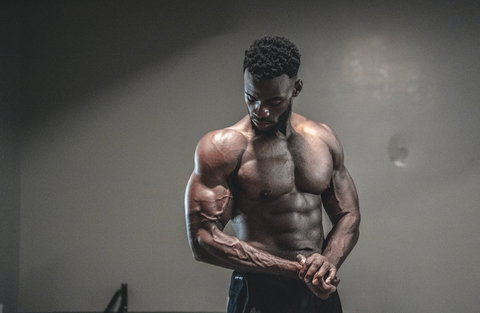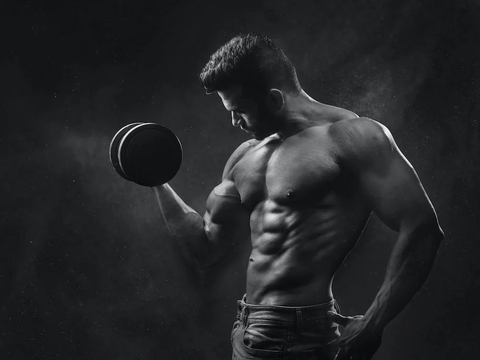Do Bodybuilders Have High Cholesterol? Find Out the Truth
As it turns out, there’s more to being a bodybuilder than just going to the gym and pumping lots of iron. Many people assume that a bodybuilder’s typical diet — which is usually rich in protein — along with their intense workouts could cause them to have high cholesterol. In this article, Revive MD will be looking into whether bodybuilders do have high cholesterol.
Our goal is to clear up any misunderstandings surrounding this topic and give you some helpful information about managing cholesterol. Many bodybuilders choose to take supplements to lower their cholesterol, for example. Without further ado, let’s dive into the science behind bodybuilding and learn about what affects cholesterol levels in bodybuilders.

What Is Cholesterol?
If you’re wondering what cholesterol is, exactly, you’re certainly not alone. Maybe, after getting a blood test, your doctor told you that your cholesterol was too high, and you’re wondering what that means. Cholesterol, which is a waxy material, is naturally present in the cells all over your body. Basically, it helps your body digest fats and keeps things running smoothly.
Here’s where things get a bit complicated, though: cholesterol doesn’t travel alone in your bloodstream. It catches rides on carriers called lipoproteins. There are two main types of lipoproteins: LDL (low-density lipoprotein) and HDL (high-density lipoprotein).
-
LDL cholesterol is usually referred to as the “bad” cholesterol because too much of it can lead to plaque building up in your arteries. This, in turn, raises the risk of heart problems, like Coronary Heart Disease.
-
HDL cholesterol is known as the “good” cholesterol because it helps take away extra cholesterol from your bloodstream, which lowers the risk of heart problems.
Another important marker your doctor may check is triglycerides. These are another type of fat found in your blood, and when levels are high, they can increase the risk of heart disease, especially when paired with high LDL or low HDL.
So, what do healthy numbers look like? In general:
-
LDL cholesterol should be less than 100 mg/dL.
-
HDL should be above 40 mg/dL for men and above 50 mg/dL for women.
-
Triglycerides are considered normal if they’re below 150 mg/dL.
Keeping your levels in these ranges, along with watching total cholesterol, which should ideally stay under 200 mg/dL, is one of the best ways to protect your long-term heart health.
Does Bodybuilding Increase Cholesterol?
There’s not really a straight answer to the question “Does bodybuilding increase cholesterol?” and this is probably because the real answer is: “It depends.” Sure, bodybuilders tend to eat a lot of meat and have higher muscle mass, but those who eat a balanced diet and focus more on eating lean meats won’t necessarily be at risk of having high cholesterol levels.
There’s actually been a lot of debate over whether or not weight training and other forms of resistance exercise can lower "bad" dietary cholesterol (LDL) while boosting "good" cholesterol (HDL). Recent studies suggest that weight training, indeed, has a positive effect on blood cholesterol levels, especially when paired with physical activities like running, swimming, or biking.
Not all weight workouts are equal in this regard, though. Whether or not bodybuilding is going to increase or reduce your cholesterol will usually depend on how often you work out and how hard you push yourself.
Now, research shows that bodybuilders typically don't have higher cholesterol levels than other people. Actually, regular exercise, which is a big part of bodybuilding, tends to improve cholesterol.
By doing both weightlifting and cardio, you can increase your HDL (good cholesterol) while lowering your LDL (bad cholesterol). As you can imagine, this is a great way to reduce the risk of developing heart problems.
That said, what you eat makes a big difference. Once again, while bodybuilders do eat lots of protein, the type of protein they eat matters a lot. Bodybuilders who eat a lot of chicken and fish, for example, will have an easier time keeping their cholesterol levels in check than bodybuilders who choose to eat a lot of red meat.

What About Bodybuilders Who Take Steroids?
While taking performance-enhancing drugs, like anabolic steroids, isn’t especially healthy, some bodybuilders do take them. Anabolic steroids can negatively impact cholesterol levels, so the idea that “bodybuilders have high cholesterol” may stem from the negative stereotype that “all bodybuilders take steroids.”
Again, we’d like to reiterate that most serious bodybuilders do not take anabolic steroids. It’s still important to acknowledge the fact that some do, though, since steroids have such a negative impact on cholesterol and health in general. It’s also illegal to take these types of substances, so if you’re thinking about getting into bodybuilding, you’d be much better off sticking to dietary supplements!
How Steroids Affect Cholesterol
Anabolic steroids don’t just help build muscle; they also have serious side effects on cholesterol and heart health. Steroids interfere with the way your liver processes fats, which can:
-
Lower HDL (“good”) cholesterol – This reduces your body’s ability to clear excess cholesterol from the bloodstream.
-
Raise LDL (“bad”) cholesterol – Higher LDL levels make it easier for plaque to build up in your arteries.
-
Increase triglycerides – Steroid use can raise blood triglyceride levels, another risk factor for heart disease.
-
Harden arteries (atherosclerosis) – Over time, this combination speeds up arterial damage and raises the risk of heart attack or stroke.
Even short-term steroid use can cause noticeable changes in cholesterol levels, and long-term use makes those risks much worse. That’s why doctors strongly warn against anabolic steroid use for bodybuilding; the cardiovascular toll often outweighs the muscle gains.
10 Warning Signs of High Cholesterol
High cholesterol is often a silent condition; it rarely causes symptoms on its own. Most people discover high cholesterol only through a blood test, not because of physical warning signs. However, when high cholesterol leads to complications like clogged arteries, certain symptoms can appear. Here’s what’s accurate and what’s not when it comes to “warning signs”:
-
Chest Pain or Angina – A feeling of tightness, heaviness, or pressure in your chest could be linked to plaque buildup in your arteries.
-
Shortness of Breath – Struggling to catch your breath during light activity might mean your heart isn’t getting enough oxygen-rich blood.
-
Numbness or Coldness in Limbs – Poor circulation caused by blocked arteries can make your hands and feet feel cold or tingly.
-
Fatigue – Feeling unusually tired, even after rest, can sometimes be connected to restricted blood flow.
-
High Blood Pressure – Elevated cholesterol often pairs with high blood pressure, which can further strain your heart.
-
Xanthomas (Fatty Deposits Under the Skin) – These appear as small yellowish bumps, usually around the eyes, elbows, or knees, and are a physical sign of high cholesterol.
-
Dizziness or Lightheadedness – Reduced blood flow to the brain can cause frequent dizziness.
-
Difficulty Healing Wounds – If cuts or sores take longer than usual to heal, it could be related to circulation issues tied to cholesterol.
-
Neck or Jaw Pain – This kind of pain, especially during physical exertion, can sometimes be a sign of restricted blood flow.
-
Family History of High Cholesterol or Heart Disease – Not a symptom you “feel,” but genetics plays a big role. If it runs in your family, it’s a red flag worth paying attention to.
Most people with high cholesterol experience no symptoms until serious complications develop. These listed “warning signs” are usually signs of advanced disease or complications, not of high cholesterol itself. The only reliable way to know your cholesterol levels is with a blood test. If you have risk factors or are unsure, ask your doctor whether you need to be screened.
Eating a Balanced Diet to Manage Your Cholesterol
If your doctor has advised you to shed some body fat because you have an elevated level of cholesterol, you might feel frustrated with the dietary changes you need to make. It can be difficult to make these dietary changes, but this guide should help.
First of all, starting a regular exercise routine is one of the best things you can do if you want to lower your cholesterol. Aim for at least thirty minutes of aerobic activity each day, if possible. When it comes to food, you might worry about remembering all of the dos and don'ts. Don't stress about it too much, just keep the basics in mind.
You’ll want to cut down on foods that are high in saturated fat and sugar, and gradually increase your fiber intake (we say "gradually" because a sudden increase in fiber could cause stomach problems). Here's a breakdown of how someone with high cholesterol should approach eating different types of foods:
Eggs
When it comes to eggs, focus on the egg whites or egg substitutes. You’ll want to limit yourself to no more than two egg yolks per week to manage cholesterol intake effectively. The yolk is, of course, the most delicious part of the egg, so this may be a difficult habit to get into. Over time, you’ll notice the difference in how you feel, though!
Fruits
For fruits, you should be eating about three half-cup servings of fresh fruit daily. Citrus fruits, like oranges, are especially beneficial when it comes to managing cholesterol levels. You’ll want to steer clear of coconuts, though, since they’re high in saturated fat.
Vegetables
Vegetables are generally a great choice, but which veggies are the best choice when it comes to lowering cholesterol levels? We’d recommend prioritizing vegetables that are high in fiber — such as broccoli, celery, cauliflower, and potato skins. Eating your veggies is more important than you might think, so don’t hesitate to load your plate whenever you get the chance!
Meats
Most people are aware of the fact that eating too much red meat can make cholesterol levels skyrocket. This is another reason why many people think that bodybuilders have high cholesterol. When eating meat, you’ll want to avoid fatty red meats like pork, duck, and goose. Instead, opt for chicken and fish, and bake or broil instead of frying.
Bread
When it comes to bread, it’s always a good idea to opt for whole-grain varieties like whole wheat or oat bread. If you can, try to avoid pastries and rolls since they tend to be very high in sugar. If you’re baking at home, you can use margarine instead of butter and egg substitutes instead of regular eggs.
Beans and legumes
Beans and legumes are excellent sources of protein and fiber, so you can’t go wrong with eating plenty of beans if you’re working towards lowering your cholesterol. You’ll want to avoid baked beans with added pork or sugar, though, since pork and sugar are likely to raise your cholesterol levels.
Cereal
Yes, cereal is on this list, but that doesn’t mean you should eat Lucky Charms for breakfast every morning. You should ideally try to choose whole-grain cereals over sugary cereals (you knew we were going to say this, didn’t you?). Oatmeal is particularly effective for lowering cholesterol levels, so that’s a great choice as well.
Fats and Oils
In terms of fats and oils, you should try to avoid butter and opt for soft margarine instead. Ideally, you should use vegetable oils that are high in polyunsaturated fats, such as sunflower, safflower, soybean, and corn oil. At all costs, try to avoid coconut oil or oils made from animal fats. These types of oils can increase your risk of heart disease.
Beverages
When it comes to beverages, it’s best to drink water, black coffee, and juices that don’t contain a lot of sugar. You should try to avoid drinking alcohol or soda since these drinks tend to include a lot of sugar and can pose a risk factor for cardiovascular disease. Avoiding sugary drinks can also help with weight loss.

How Supplements Can Help Lower Cholesterol Levels
Supplements can be very helpful when it comes to keeping your cholesterol levels in check, and Revive MD offers several supplement options that are specifically made for this very purpose. Our products contain special ingredients that are well-known for their ability to support good cholesterol and heart health.
For example, many of our supplements contain Beta-sitosterol, which is a plant substance that's similar to cholesterol and is found in many natural foods like fruits, veggies, nuts, and seeds. Basically, it acts like cholesterol in your body and competes with it for space in your intestines, which might lead to lower levels of LDL cholesterol.
Another notable ingredient in our supplements is citrus bergamot. Bergamot is full of special compounds, like flavonoids and statin-like molecules that work together to keep your heart healthy. We also use pantethine in our supplements, which is made from vitamin B5 and has been shown, through research, to lower cholesterol levels.
We also use plenty of Omega-3 fatty acids in our supplements. These healthy fats are found in fish, like salmon and mackerel. They're great for your heart because they lower triglycerides, which are another type of fat in your blood. They might even slightly lower LDL cholesterol levels, which is great news.
Revive's Cholesterol Support Bundle is a combination of different supplements that cover all the bases for managing cholesterol. These supplements contain ingredients that have been carefully studied and third-party purity tested. By taking these supplements regularly, you can support your heart health and keep your cholesterol levels where they should be.
Maintain Healthy Cholesterol Levels With Revive’s Supplements
Maintaining healthy cholesterol levels isn’t always easy, especially for older people and those who eat a lot of meat (like bodybuilders, for example). Getting regular exercise (preferably a healthy combination of aerobic exercise and weight training) and eating a balanced diet is going to be the absolute best way to keep your cholesterol in check.
You can also, of course, take supplements to manage your cholesterol even more effectively. By taking Revive MD’s Lipid, for example, you can maintain already-healthy cholesterol levels. Just remember to keep an eye on your diet and follow a regular exercise routine at the same time!
Frequently Asked Questions About Bodybuilding and Cholesterol
Can lifting weights cause high cholesterol
Not directly. Lifting weights on its own doesn’t raise cholesterol levels; in fact, resistance training often helps improve cholesterol by lowering LDL (“bad”) cholesterol and boosting HDL (“good”) cholesterol. What matters more is diet. If weightlifting is paired with a diet heavy in red meat, fried foods, or saturated fats, cholesterol levels can creep up.
Can you be in good shape and have high cholesterol?
Yes, absolutely. High cholesterol isn’t only about body fat or muscle mass; it can also be influenced by genetics, age, and diet. Someone who looks fit and works out regularly might still have high cholesterol if it runs in their family or if their eating habits aren’t balanced. That’s why regular blood tests are important, no matter how “healthy” you look on the outside.
Is high cholesterol reversible?
In many cases, yes. By making lifestyle changes, like eating more fiber-rich foods, cutting back on saturated fats, exercising regularly, and sometimes using supplements or medication, you can significantly lower cholesterol levels. The earlier you take action, the more likely you are to reverse or reduce the risks associated with high cholesterol.
What is the best exercise for high cholesterol?
A mix of aerobic exercise and strength training works best. Activities like running, cycling, swimming, or even brisk walking are especially effective at lowering LDL cholesterol. When combined with weightlifting or resistance training, you’ll see an even bigger boost to HDL cholesterol. The key is consistency; aim for at least 150 minutes of moderate activity per week.
How often should bodybuilders check their cholesterol?
For most healthy adults, cholesterol should be checked every 4–6 years. But if you’re a bodybuilder eating a high-protein diet, using supplements, or if you have risk factors like a family history of high cholesterol, it’s smart to get tested more often, ideally once a year. Regular checkups help catch changes early so you can adjust your training and diet before problems arise.
Does protein powder affect cholesterol?
Most protein powders, like whey, casein, or plant-based options, don’t raise cholesterol on their own. In fact, whey protein has even been shown to slightly lower LDL cholesterol in some studies. The main thing to watch for is what’s added to the powder. Powders with lots of sugar, creamers, or unhealthy fats can affect cholesterol negatively, so stick to clean, minimal-ingredient options when possible.
The information being presented in this blog is intended to be used as educational or resource information only. It is not intended to be a substitute for medical advice from your healthcare provider. This content should not be used for the diagnosis or treatment of any medical condition. If you have any questions or concerns about your health, please contact your healthcare provider. You should call 911 for all medical emergencies. Revive MD is not liable for any advice or information provided on this blog, which advice or information is provided on an “as-is” basis, and assumes no liability for diagnosis, treatment, decisions, or actions made in reliance upon any advice or information contained on this blog. No warranties, express or implied, are made on the information that is provided.

